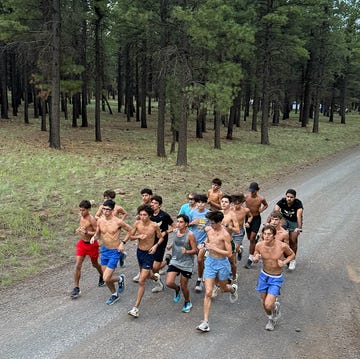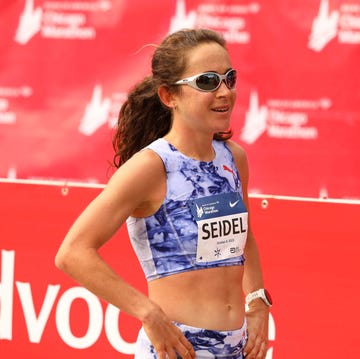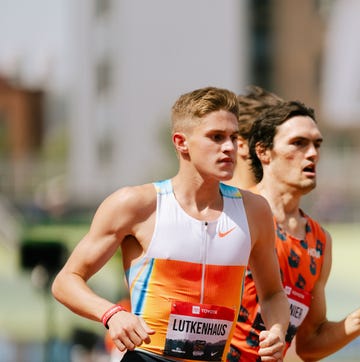Like many athletes who are preparing for potentially warm conditions at February’s Olympic Marathon Trials in Orlando, Florida, Aaron Gruen is spending his winter in a temperate climate.
The Providence, Rhode Island, resident flew south this month for a training camp in Scottsdale, Arizona, with a cohort of professional athletes from New England, including Molly Huddle and Emily Sisson.
Gruen bought two seats for the plane ride over. An aisle seat for himself and a window seat for his 98-year-old companion: an Italian-made Giovanni Rossi cello.
“I can’t do without it,” he said.
Gruen, 24, qualified for the Olympic Trials at the McKirdy Micro Marathon in October, running 2:15:56. It was only his fourth marathon, and he averaged 5:11 mile pace.
He’s also an accomplished classical musician. Since he was a young child, Gruen has devoted his life to mastering the cello, practicing anywhere from three to eight hours a day, and performing at venues across the world.
That leaves just enough time for running—something that Gruen has been doing at an elite level in recent years.
“I like to describe myself as someone who is a musician and also happens to run,” he said.
Finding a balance
Gruen was born in Germany to a German mother and American father and later moved to the U.S. to attend Brown University. (In fact, he has triple citizenship: Austria, Germany, and the United States.)
Gruen first picked up a cello when he was 4 years old. He quickly developed a passion for the instrument, eventually studying at a music conservatory in London during high school and later at Brown. From the fall of 2020 to 2021, Gruen spent a year at the Prague Conservatory in an intensive music program, where he practiced cello anywhere from six to eight hours a day.
Prague is where Gruen cultivated his love for running. Before long days of one-on-one instruction, Gruen would wake up before sunrise to log miles around the Czech capital, often along the Vltava River, which cuts through the core of the historic city. Gruen had been running since sixth grade, making the varsity cross-country team at his school in the U.K. and running on the club team at Brown, but his time in Prague during the COVID-19 pandemic allowed him to train consistently at high mileage.
Once he returned to the U.S. in the fall of 2021, Gruen entered his first marathon, the Providence Marathon, where he ran 2:34:44 to finish third. Two months later, he placed fourth at the San Francisco Marathon in 2:39:37.
Gruen’s breakout race came at the 2023 Boston Marathon, where he crossed the line in a big PR of 2:21:43. “I was honestly surprised with my success and running and the results that I saw,” he said. “I saw that the Olympic Trials qualification wasn’t too far off.”
So Gruen, along with his new coach, Kurt Benninger, upped his mileage to around 100 miles a week in preparation for a shot at the qualification time—2:18:00—at the McKirdy Micro Marathon, which was billed as an event to help hopefuls achieve the standard.
Thirty-three runners hit the time, including Gruen. “The stars aligned,” he wrote in a post-race Strava post.
Parallels and purpose
Gruen notes that there are a lot of similarities between playing cello and running at an elite level. He feels that rather than interfering with each other—or competing for his time and energy—his passions go hand-in-hand.
“Before I started running competitively, I already had a long-term mindset through playing the cello,” he said. “For example, after a successful concert, I allow myself to celebrate for a day and ask myself, then, ‘What’s next? How can I improve? What didn’t go well?’’’
“It’s kind of the same in running,” he said. “It’s not about one race or one concert—it’s a lifetime commitment to something I love to do.”
Although Gruen is relatively new to the elite side of running, he has big goals. He thinks he’ll be fit enough to crack the top 20 of the Trials on February 3. His strengths, he said, come in the second half of the race, so he plans to start conservatively and gradually move up.
In the long term, Gruen has his sights set on the Austrian national record in the marathon, which is 2:10:06, set by Peter Herzog at the 2020 London Marathon. But he also plans on continuing to perform in orchestras and book gigs.
And if that’s not enough on his plate, Gruen intends to enroll in medical school in August. He’s aware of the schedule constraints, but he feels he’s prepared for the undertaking; he’s no stranger to time management and relishes the daily grind.
Med school has been on Gruen’s radar throughout college, and he feels the tripartite of running, music, and medicine will help him learn more about himself and the world.
“At the end of the day, you only have one life on this earth,” Gruen said. “One thing I’m trying to do is get a sense of what it means to be human and really understand what humans are capable of.”
Theo Kahler is the news editor at Runner’s World. He’s a former all-conference collegiate runner at Winthrop University, and he received his master’s degree in liberal arts studies from Wake Forest University, where he was a member of one of the top distance-running teams in the NCAA. Kahler has reported on the ground at major events such as the Paris Olympics, U.S. Olympic Trials, New York City Marathon, and Boston Marathon. He’s run 14:20 in the 5K, 1:05:36 in the half marathon, and enjoys spotting tracks from the sky on airplanes. (Look for colorful ovals around football fields.)















